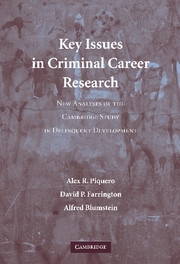 Key Issues in Criminal Career Research
Key Issues in Criminal Career Research Published online by Cambridge University Press: 30 July 2009
How long do criminal careers last? Is their duration short (a few years), medium (several years), or long (many years)? Do some identifiable offenders have longer careers than other offenders? Are careers in one crime type longer than those in another crime type? Can estimates of career length be obtained given the truncation observed in many longitudinal data sets? What about residual career length, or the expected time remaining in an offender's career at the time of a particular intervention (such as incarceration)? Can we develop estimates of an offender's expected time left in a career?
Career length questions are central to both theory and policy, but the policy questions are particularly salient. For example, if offenders have short careers, then criminal justice policies such as three-strikes laws, with their lengthy incarceration terms, may waste scarce resources. This will be the case because offenders' careers are likely to be over well before the end of their lengthy incarceration. Thus, knowledge of career lengths, particularly residual career lengths, can provide important information for policy guidance. Additionally, information on the correlates associated with both short and long careers will be of use in attempts to modify criminal careers. For example, a strong relationship between legitimate employment and termination of criminal careers may suggest greater attention to employment facilitation as a useful policy intervention (Blumstein et al., 1986:85).
Research has examined the career length issue in one of three ways.
To save this book to your Kindle, first ensure [email protected] is added to your Approved Personal Document E-mail List under your Personal Document Settings on the Manage Your Content and Devices page of your Amazon account. Then enter the ‘name’ part of your Kindle email address below. Find out more about saving to your Kindle.
Note you can select to save to either the @free.kindle.com or @kindle.com variations. ‘@free.kindle.com’ emails are free but can only be saved to your device when it is connected to wi-fi. ‘@kindle.com’ emails can be delivered even when you are not connected to wi-fi, but note that service fees apply.
Find out more about the Kindle Personal Document Service.
To save content items to your account, please confirm that you agree to abide by our usage policies. If this is the first time you use this feature, you will be asked to authorise Cambridge Core to connect with your account. Find out more about saving content to Dropbox.
To save content items to your account, please confirm that you agree to abide by our usage policies. If this is the first time you use this feature, you will be asked to authorise Cambridge Core to connect with your account. Find out more about saving content to Google Drive.